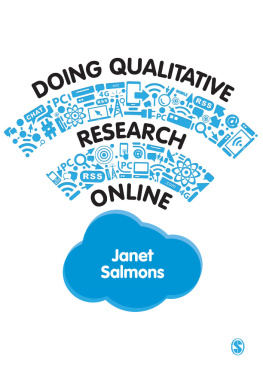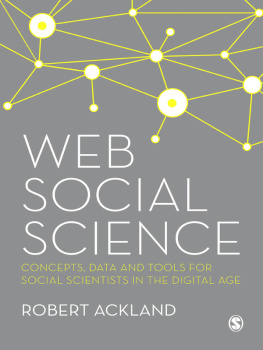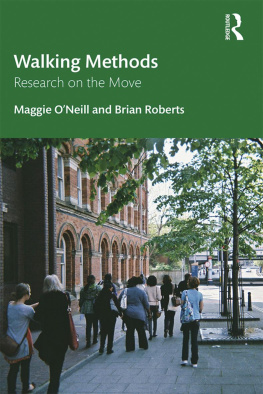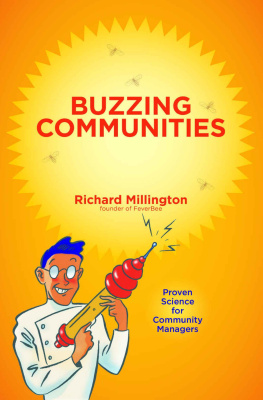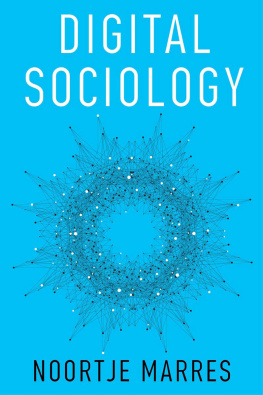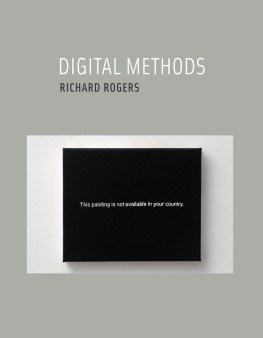RESEARCH METHODS AND GLOBAL ONLINE COMMUNITIES
Research Methods and Global Online Communities
A Case Study
ALEXIA MADDOX
Deakin University, Australia
First published 2015 by Ashgate Publishing
Published 2016 by Routledge
2 Park Square, Milton Park, Abingdon, Oxon OX14 4RN
711 Third Avenue, New York, NY 10017, USA
Routledge is an imprint of the Taylor & Francis Group, an informa business
Copyright Alexia Maddox 2015
Alexia Maddox has asserted her right under the Copyright, Designs and Patents Act, 1988, to be identified as the author of this work.
All rights reserved. No part of this book may be reprinted or reproduced or utilised in any form or by any electronic, mechanical, or other means, now known or hereafter invented, including photocopying and recording, or in any information storage or retrieval system, without permission in writing from the publishers.
Notice:
Product or corporate names may be trademarks or registered trademarks, and are used only for identification and explanation without intent to infringe.
British Library Cataloguing in Publication Data
A catalogue record for this book is available from the British Library
Library of Congress Cataloging-in-Publication Data
Maddox, Alexia.
Research methods and global online communities : a case study / by Alexia Maddox.
pages cm
Includes bibliographical references and index.
ISBN 9781472434579 (hardback : alk. paper) ISBN 9781315605562 (ebook) ISBN 9781317065647 (epub)
1. Online social networks. 2. Social sciences Research. 3. Communities. 4. Globalization. I. Title.
HM742.M325 2015
302.30285dc23
2015008097
ISBN 9781472434579 (hbk)
ISBN 9781315605562 (ebk-PDF)
ISBN 9781317065647 (ebk-ePUB)
Contents
List of Figures and Tables
Figures
Tables
Acknowledgements
The journey from immersive fieldwork to writing a research methods book has transformed me, both as a person and as a research practitioner. In particular, I acknowledge the contribution made by the people who participated in the herper community research presented in these pages. I am grateful that you took the time to share your experiences and passions with me and opened my world to the beautiful and unique nature of amphibians and reptiles. This is my contribution to you in return. Thank you.
It was a pleasure to work with Dr Kevin Brown, Dr Vince Marotta and Dr Brad Warren as the supervisors of my doctoral research, which forms the foundation of learning held in this book. You provided me with much that has been instrumental in my growth and capacity as a researcher and held the space for me to complete this research. Thank you. I also acknowledge with gratitude the intellectual contributions to this work of Professor Roger Burrows, Professor Gustavo Mesch, Associate Professor Karen Farquharson and Associate Professor Malcolm Alexander.
During the travelling lifestyle that is at the core of this research, and my exposure to the range of research methods available, I had many inspiring conversations with academics around the world. In particular I would like to acknowledge Professor Richard Rogers, Professor Bruno Latour, Professor Barry Wellman, Dr Robert Ackland, Professor Garry Robins, and Professor Deborah Lupton for the directions and possibilities that you introduced me to.
Throughout the transformation of this research, I received personal and professional support from Harry Nazikian, Dr Sophie Vasiliadis, Dr Monica Barratt, Dr Esther Chan, Dr Jolynna Sinanan, Peter Benda, Associate Professor Bryan Fry, Tina Lavelle, Dr Janette Norman and Dianna Tarr. Thank you for helping me to make it through this journey with limbs, heart, soul and data intact. To Catherine, Carolyn and Cec Maddox, I am grateful for the life-lessons and support you have provided over the years.
I am also grateful to the people who gave technical assistance along the way: My thanks and appreciation go to Ralph Lavelle and the Kilbot Factory for assistance in digitising a custom survey, to Kingsnake.com for hosting the survey and to David Semetsky, Dr Erin ODwyer and Stu Hatton for editing the work and mentoring me in the art of writing.
An earlier version of have been published elsewhere, as a conference publication for the Australian Sociological Association in an article titled Reassessing the theorisation of community experience with the digitally mediated, global context (Maddox and Warren, 2011).
Finally, for inspiring conversations and helpful comments, I would like to thank Meredith Lewis, Romaine Logere, Dr Chris Marmo, Dr Ken Winkel, Dr Kim Roelants, Dr Christofer Clemente, Dr Karen Lane, and the many people through whom I have gained ideas and inspiration, both big and small, that have led to the accumulated insights presented here.
Foreword
The aim of this book is to rethink how to identify the characteristics of community in the information age. In doing so, the book uses the case study of the herper community as a way to introduce scholars into a contemporary approach to the study of communities. The study of communities has a long tradition within the social sciences. In practice, this established field of research supports the ability of the community researcher to build upon resilient conceptual and methodological toolkits that facilitate scholarly practice and research rigour. For the researcher, a community is often the site from which we collect data to generate sociological insight because of its clearly defined parameters and implied social coherence. These parameters exist in the capacity of a community to be observed and in the presence of internal social, organisational and institutional connections that indicate a cohesion and commonality of social experience. In this way, community becomes regarded as a microcosm of the wider society that it is contextual to.
In choosing to study a community, the researcher must balance their choice to study collective social patterns and experiences with the burgeoning research trend towards big data analysis to produce social insights. While big data is able to provide environmental information for community studies, it presents a scale of challenges through its conceptual underdevelopment, lack of direction by a research question and developing methodologies. Despite the sophistication of these techniques and approaches, the question of consistency and congruency of the parameters through which big data is formed remains one of the main challenges for data mining and interpretation. Consequently, research into communities is one of the key processes that social scientists use to make sense of the patterns of social life we see around us, particularly those patterns that suggest a capacity for collective action, social support and individual well-being within societies.
While community may be proclaimed to be the safety net of society (Bauman, 2001), it is also the safety net of social researchers. However, this book argues that it is time for community scholars to examine the foundations of our assumptions on the community construct and consider whether these are stifling the relevance, impact and applicability of social insights we can produce from studying contemporary community formats. The reason for this being the premise of the safety-net, that community occurs within a time and place. For digital community, these notions are augmented to argue that community occurs across decentralised, open social structures that emerge both through and beyond the constraints of a single place or time and flourish in an evolving space of technological enablement.


